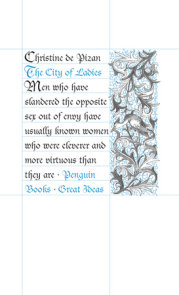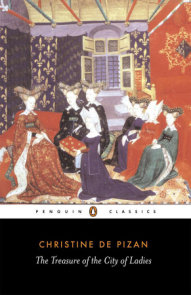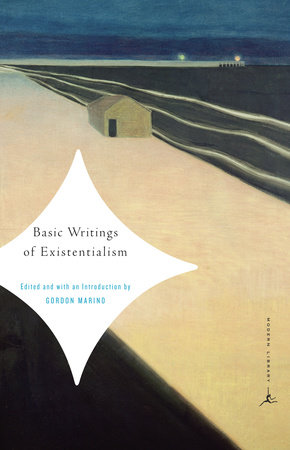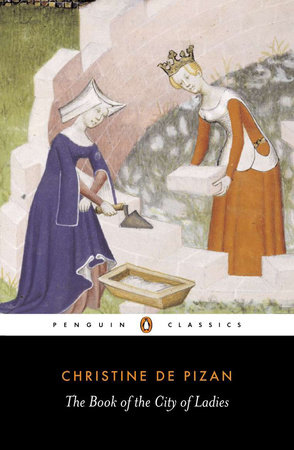

The Book of the City of Ladies
By Christine de Pizan
Introduction by Rosalind Brown-Grant
Translated by Rosalind Brown-Grant
By Christine de Pizan
Introduction by Rosalind Brown-Grant
Translated by Rosalind Brown-Grant
Category: Classic Fiction | Literary Fiction | Historical Fiction

-
$15.00
Jan 01, 2000 | ISBN 9780140446890
Buy the Paperback:
YOU MAY ALSO LIKE

On Art and Life
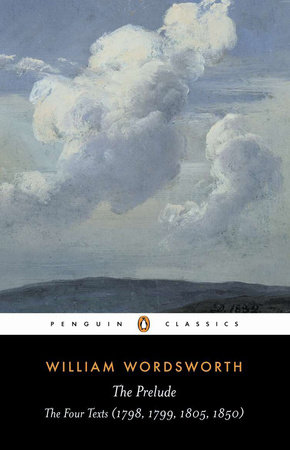
The Prelude
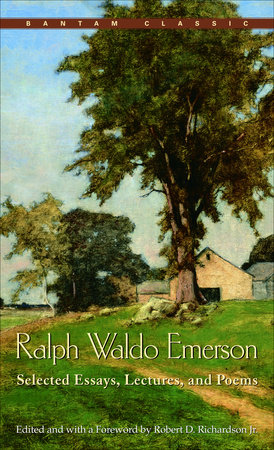
Ralph Waldo Emerson
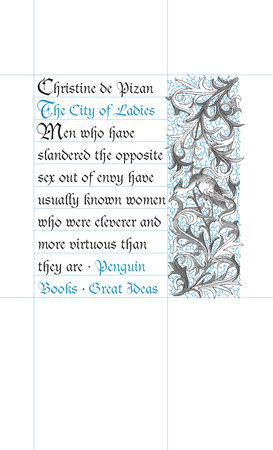
The City of Ladies
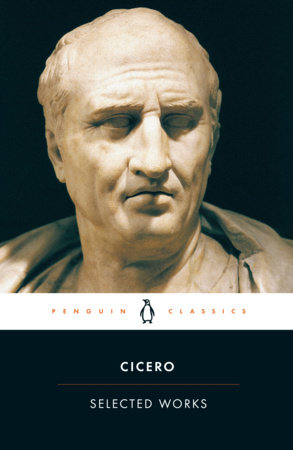
Selected Works (Cicero, Marcus Tullius)

The European Philosophers from Descartes to Nietzsche
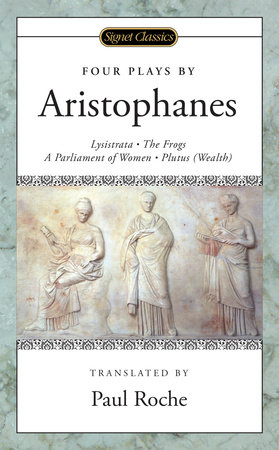
Four Plays
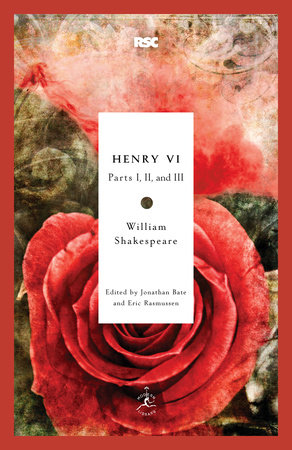
Henry VI
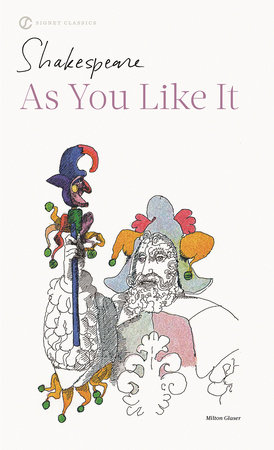
As You Like It
Table Of Contents
Translated with an Introduction and Notes by Rosalind Brown-Grant
Acknowledgments
Introduction
Translator’s Note
THE BOOK OF THE CITY OF LADIES
Part One
1. Here begins the Book of the City of Ladies, the first chapter of which explains why and for what purpose the book was written.
2. Christine tells how three ladies appeared to her, and how the first of them spoke to her and comforted her in her distress.
3. Christine recounts how the lady who had spoken to her told her who she was, what her function and purpose was, and how she prophesied that Christine would build a city with the help of the three ladies.
4. How, before the lady revealed her name, she spoke at greater length about the city which Christine was destined to build, and explained that she was entrusted with the task of helping her to construct the enclosure and external walls.
5. Christine tells how the second lady gave her name, explained what her role was, and revealed how she would help Christine to lay out the buildings of the City of Ladies.
6. Christine tells how the third lady revealed her name and outlined what her role was, then explained that she would help to finish off the high turrets of the towers and palaces and would bring Christine a queen for her city accompanied by a host of noble ladies.
7. Christine tells how she replied to the three ladies.
8. Christine explains how Reason instructed her and helped her to begin digging up the ground in order to lay the foundations.
9. How Christine dug over the earth: in other words, the questions which she put to Reason and the answers she received from her.
10. More questions and answers on this subject.
11. Christine asks Reason why women aren’t allowed in courts of law, and Reason’s reply.
12. About the Empress Nicaula.
13. About a queen of France called Fredegunde, and other French queens and princesses.
14. More discussion and debate between Christine and Reason.
15. About Queen Semiramis.
16. About the Amazons.
17. About the Amazon queen, Thamiris.
18. How the mighty Hercules and his companion Theseus came from Greece to attack the Amazons with a great army and fleet of ships, and how the two maidens Menalippe and Hippolyta brought them down, horses and all, in a big heap.
19. About Queen Penthesilea and how she went to the rescue of the city of Troy.
20. About Zenobia, Queen of Palmyria.
21. About the noble Queen Artemisia.
22. About Lilia, mother of the valiant night Theodoric.
23. More about Queen Fredegunde.
24. About the virgin Camilla.
25. About Queen Berenice of Cappadocia.
26. About the brave Cloelia.
27. Christine asks Reason if God has ever blessed a woman’s mind with knowledge of the highest branches of learning, and Reason’s reply.
28. Reason begins to speak about ladies who were blessed with great learning, starting with the noble maiden Cornificia.
29. About Proba the Roman.
30. About Sappho, who was an extremely fine poet and philosopher.
31. About the maiden Manto.
32. About Medea, and another queen named Circe.
33. Christine asks Reason if any woman has ever invented new forms of knowledge.
34. About Minerva, who invented countless sciences, including the art of making arms from iron and steel.
35. About Queen Ceres, who invented agriculture and many other arts.
36. About Isis, who discovered the art of making gardens and growing plants.
37. About all the great good that these ladies have brought into the world.
38. More on the same topic.
39. About the maiden Arachne, who invented the arts of dyeing wool and of weaving fine tapestries, as well as the art of growing flax and making it into cloth.
40. About Pamphile, who discovered the art of gathering silk from worms, dyeing the thread and making it into cloth.
41. About Thamaris, who was a supremely gifted painter, as well as another great artist called Irene, and Marcia the Roman.
42. About Sempronia of Rome.
43. Christine asks Reason if women are naturally endowed with good judgement, and Reason replies to her question.
44. The “Epistle of Solomon” from the Book of Proverbs.
45. About Gaia Cirilla.
46. About the good sense and cleverness of Queen Dido.
47. About Opis, Queen of Crete.
48. About Lavinia, daughter of King Latinus.
Part II
Here begins the second part of the Book of the City of Ladies which recounts how and by whom the houses and buildings were constructed inside the enclosure walls and how the City was filled with inhabitants.
1. The first chapter tells of the ten Sibyls.
2. About the sibyl Erythrea.
3. About the sibyl Almathea.
4. About several prophetesses.
5. About Cassandra and Queen Basine, as well as more about Nicostrata.
6. About Antonia, who became empress of Constantinople.
7. Christine addresses Lady Rectitude.
8. Here begins a series of daughters who loved their parents, the first of whom is Drypetina.
9. About Hypsipyle.
10. About the virgin Claudine.
11. About a woman who breastfed her mother in prison.
12. Here Rectitude explains that the houses of the city have been completed and that it is time they were filled with inhabitants.
13. Christine asks Lady Rectitude if it’s true what men and books say about the institution of marriage being unbearable because women are so impossible to live with. In her reply, Rectitude begins by discussing the great love that women have for their husbands.
14. About Queen Hypsicratea.
15. About the Empress Triaria.
16. More about Queen Artemisia.
17. About Argia, daughter of King Adrastus.
18. About the noble lady Agrippina.
19. Christine addresses Rectitude, who replies to her with several examples, telling her about the noble lady Julia, daughter of Julius Caesar and wife of the prince Pompey.
20. About the noble lady Tertia Aemilia.
21. About Xanthippe, wife of the philosopher Socrates.
22. About Pompeia Paulina, Seneca’s wife.
23. About the noble Sulpicia.
24. About several ladies who, together, saved their husbands from execution.
25. Christine speaks to Lady Rectitude about those who claim that women cannot keep a secret. In her reply, Rectitude talks about Portia, Cato’s daughter.
26. On the same subject: about the noble lady Curia.
27. More on this subject.
28. Proof against those who claim that only an idiot takes his wife’s advice or puts his trust in her. Christine asks some questions to which Rectitude replies.
29. About various men who did well to trust their wives’ advice.
30. Christine talks about all the good that women have brought into the world, both now and in the past.
31. About Judith, the noble widow.
32. About Queen Esther.
33. About the Sabine women.
34. About Veturia.
35. About Clotilde, Queen of France.
36. Against those who claim that it is not good for women to be educated.
37. Christine addresses Rectitude, who gives examples to contradict those who claim that few women are chaste, beginning with Susanna.
38. About Sarah.
39. About Rebecca.
40. About Ruth.
41. About Penelope, Ulysses’s wife.
42. Against those who assert that there are very few chaste and attractive women: the example of Mariamme.
43. More on this subject: the example of Antonia, wife of Drusus Tiberius.
44. In order to contradict those who claim that women want to be raped, here begins a series of examples, the first of which is Lucretia.
45. On this same subject: the example of the queen of the Galatians.
46. Still on this same subject: the examples of the Sicambrians, and of several virgins.
47. Proofs to refute the view that women are lacking in constancy: Christine asks questions, to which Rectitude replies with various examples of emperors who were unreliable and inconsistent.
48. About Nero.
49. About the Emperor Galba, as well as others.
50. About Griselda, the marchioness of Saluzzo, a woman of unfailing virtue.
51. About Florence of Rome.
52. About the wife of Bernabo the Genoese.
53. After Rectitude has finished talking about women who were steadfast, Christine asks her why it is that all these worthy ladies of the past didn’t refute the men and books who slander the female sex. Rectitude gives her answer.
54. Christine asks Rectitude if it’s true what certain men have said about how few women are faithful in love, and Rectitude gives her reply.
55. On the subject of women’s constancy in love: the example of Dido, Queen of Carthage.
56. About Medea in love.
57. About Thisbe.
58. About Hero.
59. About Ghismonda, daughter of the prince of Salerno.
60. About Lisabetta, and other women in love.
61. About Juno, and some other famous ladies.
62. Christine addresses Rectitude who, in her reply, refutes the view of those who claim that women use their charms to attract men.
63. About the Roman woman Claudia.
64. Rectitude explains that some women are loved more for their virtue than others are for their attractiveness.
65. About Queen Blanche, mother of Saint Louis, and other honest and decent ladies who were loved for their virtue.
66. Christine addresses Rectitude who, in her reply, refutes the opinion of those who claim that women are by nature mean.
67. About a generous and wealthy woman named Busa.
68. About the princesses and ladies of France.
69. Christine addresses princesses and all other ladies.
Part III
Here begins the third part of the Book of the City of Ladies, which explains how and by whom the high turrets of the towers were finished off, and which noble ladies were chosen to dwell in the great palaces and lofty keeps.
1. The first chapter recounts how Justice brought the Queen of Heaven to live in the City of Ladies.
2. About Our Lady’s sisters and Mary Magdalene.
3. About Saint Catherine.
4. About Saint Margaret.
5. About Saint Lucy.
6. About the blessed virgin Martina.
7. About another Saint Lucy who was a virgin, as well as some other saints who were virgin-martyrs too.
8. About Saint Justine and other virgins.
9. About the virgin Theodosina, Saint Barbara, and Saint Dorothy.
10. About the life of Saint Christine the virgin.
11. About several saints who saw their children being martyred in front of them.
12. About Saint Marina the virgin.
13. About the blessed virgin Euphrosyna.
14. About the blessed lady Anastasia.
15. About the blessed Theodota.
16. About the noble and holy Nathalia.
17. About Saint Afra, a repentant prostitute who turned to God.
18. Justice talks about several noble ladies who served the Apostles and other saints and gave them shelter.
19. The end of the book: Christine addresses all women.
Notes
Glossary
Bibliography
21 Books You’ve Been Meaning to Read
Just for joining you’ll get personalized recommendations on your dashboard daily and features only for members.
Find Out More Join Now Sign In








